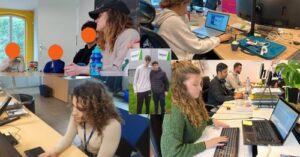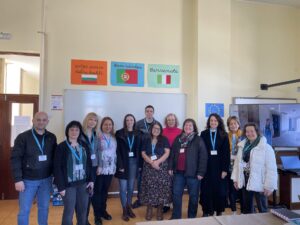We all live a new reality. The new coronavirus is changing the world at an impressive speed. All members of society are trying to adapt to this new world. The most important goal right now is to prevent the spread of the virus, therefore we were asked to stay at home, protect ourselves and others and follow the instructions of the National Health Services.
One of the first measures taken by the Portuguese government to fight the spread of COVID-19 was to close all educational establishments in the country. Since March 16th, teachers and students are doing their best to keep classes going on, now at distance and using technologies and digital tools to support their activities.
Many parents are working from home, others had to stay at home, even if their jobs cannot be performed there, because they have to look after their children who had no school to go to.
The Ministry of Education has developed an Educational website, under the slogan – “We did not stop! We are ON”– to support the educational community, where they are sharing resources, digital tools and distance learning tutorials, but also a direct telephone contact and motivational videos made by students to their pairs.
The Portuguese educational communities are exploring the many tools available online in order to communicate with parents and students and, somehow, continue teaching and learning activities. Schools from our National Network are not different and some have shared their experience with us.
For instance, Francisco de Holanda secondary school is currently using text messages, group chats on WhatsApp and emails to communicate with students and parents. The school is also trying to continue some activities that were running during classes by allowing students to finish their work, clear up doubts and deliver their essays by email. The major problem is the lack of direct contact between teacher and student, which is crucial in the educational process. To get around this, they have been recording lectures in podcasts and/or video and sharing them on several platforms like Google Classroom, Moodle or Edmodo. They use ZOOM, WebEx and Skype to maintain a certain class regularity by doing videoconferencing. Practical and laboratory classes were replaced by works on simulators such as Fritzing, MultiSim, 123DCircuits, as well as other applications available.
Teachers provide study material, such as worksheets, notes, book references, educational media for students to do at home, but they also suggest books, movies, TV shows that students can enjoy by their own or together with their families.
Similarly, the other schools are continuing their mission by reinforcing their online presence, by sharing interesting educational content by email or on their Facebook pages and websites.
The main concern of these schools is to keep common sense and balance in order to not increase the already existing social stress, resulting from this pandemic, and not to harm the students with fewer resources, less parental support and/or less access to technologies, which could cause social inequalities and, consequently, inequality in learning opportunities.
We are all living difficult times, but we are also becoming better human beings – Sharing more, collaborating more, helping more – “Divided we fight, but united we stand”, as the lyrics of this song says.
To all our friends,
Stay home, stay safe! Everything will be fine, soon.





